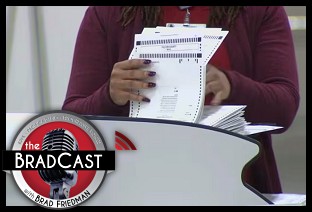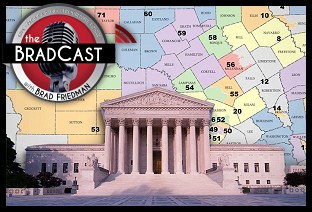 Guest Blogged by Michael Bryan, Esq.
Guest Blogged by Michael Bryan, Esq.
Judge Michael Miller, in a carefully reasoned and balanced opinion, today ordered the release of the final Diebold GEMS tabulator database files from the contested 2006 Regional Transport Authority (RTA) election 2006 primary and general elections . The judge denied, without prejudice, full public access to every MDB and GBF database file for the 2006 elections in the possession of Pima County until and unless the plaintiffs can address remaining security concerns which might arise from that larger release.
[CORRECTION: Several correspondents point out correctly that the databases for the 2006 Primary and General elections have been released, but not those of the RTA election, which was a mid-year election. Sources near the case speculate that perhaps the judge believed that the RTA election may have been tampered with and did not want further controversy around the results of that election.]
[UPDATE: For a detailed analysis of the judge's ruling see my post on BlogForArizona.com.]
The BRAD BLOG has been following this case closely because unsecured tabulation systems like GEMS are widely used in American elections and completely open to insider manipulation. For background and detailed commentary about the case see my 12/8/07 wrap-up post on the trial.
The immediate goal of the Democratic party --- to be able to look closer at the final election databases for the 2006 election --- is fully satisfied by the ruling. But the broader goal of being able to look at a time series of backups for discrepancies or discontinuities that could indicate manipulation, as Arizona Election Integrity advocates have feared, is stymied for the moment...
It is still unclear whether the judge will grant on-going injunctive relief to turn over the final database files from every election going forward. The denial of access to the entire series of database files indicates that the court may still need to be satisfied as to any remaining concerns about security resulting from on-going and multiple disclosures of this type of data before granting such an injunction.
The ruling will allow the Democratic party to perform the forensic analysis required to search for any evidence of wrong-doing. It will also allow the experts for the Democratic party to begin to more closely address the unquantified and unspecified "potential security threats" from public disclosure of the data --- consisting of how voters voted --- contained in these files, as claimed by the County. The immediate limited access granted by the court will be crucial in satisfying the court that there is little or no practical threat to elections integrity posed by this information being in the public domain. Once that task is complete, broader public access to these files (the entire backup history of the election and that of future elections) can be secured.
There is no doubt that the factual findings of the court and this ruling amount to a resounding and unqualified victory for transparency in our elections process. However, there are further battles that must be fought: to access the entire time-series of backup database files, and to gain permanent injunctive access to the files of future elections without having to litigate each time.
It remains unknown whether Pima County will appeal the limited release of data that the court has ordered.
Judge Miller's complete ruling is now available here [PDF].


 Sunday 'Domestic Terrorist' Toons
Sunday 'Domestic Terrorist' Toons 'A Cornered Rat is a Dangerous Rat': Trump Terrorizes Minn., Menaces NATO, World: 'BradCast' 1/15/26
'A Cornered Rat is a Dangerous Rat': Trump Terrorizes Minn., Menaces NATO, World: 'BradCast' 1/15/26 'Green News Report' 1/15/26
'Green News Report' 1/15/26
 'This Isn't Close to Over': Mad King Trump in Venezuela (and Beyond): 'BradCast' 1/14
'This Isn't Close to Over': Mad King Trump in Venezuela (and Beyond): 'BradCast' 1/14 Things Getting Weirder as Trump Keeps Losing: 'BradCast' 1/13/26
Things Getting Weirder as Trump Keeps Losing: 'BradCast' 1/13/26 'Green News Report' 1/13/26
'Green News Report' 1/13/26 After ICE Murder in MN, Local Cops Disown Fed Policing Practices: 'BradCast' 1/12/26
After ICE Murder in MN, Local Cops Disown Fed Policing Practices: 'BradCast' 1/12/26 Sunday 'Ice Age' Toons
Sunday 'Ice Age' Toons 'Green News Report' 1/8/26
'Green News Report' 1/8/26 Trump to Congress, Climate, U.N., Rule of Law: DROP DEAD - 'BradCast' 1/8/26
Trump to Congress, Climate, U.N., Rule of Law: DROP DEAD - 'BradCast' 1/8/26 'Nonsense': Trumpers Claim 315k Fraudulent GA Votes in 2020: 'BradCast' 1/7/26
'Nonsense': Trumpers Claim 315k Fraudulent GA Votes in 2020: 'BradCast' 1/7/26 Jack Smith Testimony on Trump J6 Crimes, DOJ Weaponization: 'BradCast' 1/6/26
Jack Smith Testimony on Trump J6 Crimes, DOJ Weaponization: 'BradCast' 1/6/26 Trump War on Venez. is About Ego, Power, 'Alien Enemies Act': 'BradCast' 1/5/26
Trump War on Venez. is About Ego, Power, 'Alien Enemies Act': 'BradCast' 1/5/26 Have a Holly Jolly Somehow
Have a Holly Jolly Somehow Old Man Shouts at People from WH for 20 Minutes: 'BradCast' 12/18/25
Old Man Shouts at People from WH for 20 Minutes: 'BradCast' 12/18/25 SCOTUS' How-To on Gerrymandering on 'Eve' of Election Year: BradCast' 12/17/25
SCOTUS' How-To on Gerrymandering on 'Eve' of Election Year: BradCast' 12/17/25 Bricks in the Wall: 'BradCast' 12/16/25
Bricks in the Wall: 'BradCast' 12/16/25
 VA GOP VOTER REG FRAUDSTER OFF HOOK
VA GOP VOTER REG FRAUDSTER OFF HOOK Criminal GOP Voter Registration Fraud Probe Expanding in VA
Criminal GOP Voter Registration Fraud Probe Expanding in VA DOJ PROBE SOUGHT AFTER VA ARREST
DOJ PROBE SOUGHT AFTER VA ARREST Arrest in VA: GOP Voter Reg Scandal Widens
Arrest in VA: GOP Voter Reg Scandal Widens ALL TOGETHER: ROVE, SPROUL, KOCHS, RNC
ALL TOGETHER: ROVE, SPROUL, KOCHS, RNC LATimes: RNC's 'Fired' Sproul Working for Repubs in 'as Many as 30 States'
LATimes: RNC's 'Fired' Sproul Working for Repubs in 'as Many as 30 States' 'Fired' Sproul Group 'Cloned', Still Working for Republicans in At Least 10 States
'Fired' Sproul Group 'Cloned', Still Working for Republicans in At Least 10 States FINALLY: FOX ON GOP REG FRAUD SCANDAL
FINALLY: FOX ON GOP REG FRAUD SCANDAL COLORADO FOLLOWS FLORIDA WITH GOP CRIMINAL INVESTIGATION
COLORADO FOLLOWS FLORIDA WITH GOP CRIMINAL INVESTIGATION CRIMINAL PROBE LAUNCHED INTO GOP VOTER REGISTRATION FRAUD SCANDAL IN FL
CRIMINAL PROBE LAUNCHED INTO GOP VOTER REGISTRATION FRAUD SCANDAL IN FL Brad Breaks PA Photo ID & GOP Registration Fraud Scandal News on Hartmann TV
Brad Breaks PA Photo ID & GOP Registration Fraud Scandal News on Hartmann TV  CAUGHT ON TAPE: COORDINATED NATIONWIDE GOP VOTER REG SCAM
CAUGHT ON TAPE: COORDINATED NATIONWIDE GOP VOTER REG SCAM CRIMINAL ELECTION FRAUD COMPLAINT FILED AGAINST GOP 'FRAUD' FIRM
CRIMINAL ELECTION FRAUD COMPLAINT FILED AGAINST GOP 'FRAUD' FIRM RICK SCOTT GETS ROLLED IN GOP REGISTRATION FRAUD SCANDAL
RICK SCOTT GETS ROLLED IN GOP REGISTRATION FRAUD SCANDAL VIDEO: Brad Breaks GOP Reg Fraud Scandal on Hartmann TV
VIDEO: Brad Breaks GOP Reg Fraud Scandal on Hartmann TV RNC FIRES NATIONAL VOTER REGISTRATION FIRM FOR FRAUD
RNC FIRES NATIONAL VOTER REGISTRATION FIRM FOR FRAUD EXCLUSIVE: Intvw w/ FL Official Who First Discovered GOP Reg Fraud
EXCLUSIVE: Intvw w/ FL Official Who First Discovered GOP Reg Fraud GOP REGISTRATION FRAUD FOUND IN FL
GOP REGISTRATION FRAUD FOUND IN FL

































